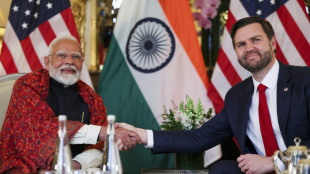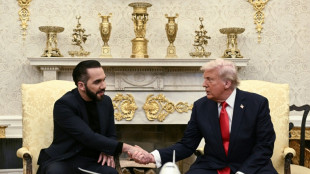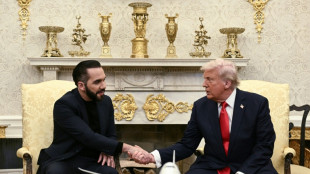
-
 Thunder crush Grizzlies as Celtics, Cavs and Warriors win
Thunder crush Grizzlies as Celtics, Cavs and Warriors win
-
Vance heads to India for tough talks on trade

-
 China slams 'appeasement' of US as nations rush to secure trade deals
China slams 'appeasement' of US as nations rush to secure trade deals
-
'Grandpa robbers' go on trial for Kardashian heist in Paris

-
 Swede Lindblad gets first win in just third LPGA start
Swede Lindblad gets first win in just third LPGA start
-
Gold hits record, dollar drops as tariff fears dampen sentiment

-
 As Dalai Lama approaches 90, Tibetans weigh future
As Dalai Lama approaches 90, Tibetans weigh future
-
US defense chief shared sensitive information in second Signal chat: US media

-
 Swede Lingblad gets first win in just third LPGA start
Swede Lingblad gets first win in just third LPGA start
-
South Korea ex-president back in court for criminal trial

-
 Thunder crush Grizzlies, Celtics and Cavs open NBA playoffs with wins
Thunder crush Grizzlies, Celtics and Cavs open NBA playoffs with wins
-
Beijing slams 'appeasement' of US in trade deals that hurt China

-
 Trump in his own words: 100 days of quotes
Trump in his own words: 100 days of quotes
-
Padres say slugger Arraez 'stable' after scary collision

-
 Trump tariffs stunt US toy imports as sellers play for time
Trump tariffs stunt US toy imports as sellers play for time
-
El Salvador offers to swap US deportees with Venezuela

-
 Higgo holds on for win after Dahmen's late collapse
Higgo holds on for win after Dahmen's late collapse
-
El Salvador's president proposes prisoner exchange with Venezuela

-
 Gilgeous-Alexander, Jokic, Antetokounmpo named NBA MVP finalists
Gilgeous-Alexander, Jokic, Antetokounmpo named NBA MVP finalists
-
Thomas ends long wait with playoff win over Novak

-
 Thunder rumble to record win over Grizzlies, Celtics top Magic in NBA playoff openers
Thunder rumble to record win over Grizzlies, Celtics top Magic in NBA playoff openers
-
Linesman hit by projectile as Saint-Etienne edge toward safety

-
 Mallia guides Toulouse to Top 14 win over Stade Francais
Mallia guides Toulouse to Top 14 win over Stade Francais
-
Israel cancels visas for French lawmakers

-
 Russia and Ukraine trade blame over Easter truce, as Trump predicts 'deal'
Russia and Ukraine trade blame over Easter truce, as Trump predicts 'deal'
-
Valverde stunner saves Real Madrid title hopes against Bilbao

-
 Ligue 1 derby interrupted after assistant referee hit by projectile
Ligue 1 derby interrupted after assistant referee hit by projectile
-
Leclerc bags Ferrari first podium of the year

-
 Afro-Brazilian carnival celebrates cultural kinship in Lagos
Afro-Brazilian carnival celebrates cultural kinship in Lagos
-
Ligue 1 derby halted after assistant referee hit by projectile

-
 Thunder rumble with record win over Memphis in playoff opener
Thunder rumble with record win over Memphis in playoff opener
-
Leverkusen held at Pauli to put Bayern on cusp of title

-
 Israel says Gaza medics' killing a 'mistake,' to dismiss commander
Israel says Gaza medics' killing a 'mistake,' to dismiss commander
-
Piastri power rules in Saudi as Max pays the penalty

-
 Leaders Inter level with Napoli after falling to late Orsolini stunner at Bologna
Leaders Inter level with Napoli after falling to late Orsolini stunner at Bologna
-
David rediscovers teeth as Chevalier loses some in nervy Lille win

-
 Piastri wins Saudi Arabian Grand Prix, Verstappen second
Piastri wins Saudi Arabian Grand Prix, Verstappen second
-
Kohli, Rohit star as Bengaluru and Mumbai win in IPL

-
 Guirassy helps Dortmund past Gladbach, putting top-four in sight
Guirassy helps Dortmund past Gladbach, putting top-four in sight
-
Alexander-Arnold lauds 'special' Liverpool moments

-
 Pina strikes twice as Barca rout Chelsea in Champions League semi
Pina strikes twice as Barca rout Chelsea in Champions League semi
-
Rohit, Suryakumar on song as Mumbai hammer Chennai in IPL

-
 Dortmund beat Gladbach to keep top-four hopes alive
Dortmund beat Gladbach to keep top-four hopes alive
-
Leicester relegated from the Premier League as Liverpool close in on title

-
 Alexander-Arnold fires Liverpool to brink of title, Leicester relegated
Alexander-Arnold fires Liverpool to brink of title, Leicester relegated
-
Maresca leaves celebrations to players after Chelsea sink Fulham

-
 Trump eyes gutting US diplomacy in Africa, cutting soft power: draft plan
Trump eyes gutting US diplomacy in Africa, cutting soft power: draft plan
-
Turkey bans elective C-sections at private medical centres

-
 Lebanon army says 3 troops killed in munitions blast in south
Lebanon army says 3 troops killed in munitions blast in south
-
N.America moviegoers embrace 'Sinners' on Easter weekend


Inside the 'golden age' of alien hunting at the Green Bank Telescope
Nestled between mountains in a secluded corner of West Virginia, a giant awakens: the Green Bank Telescope begins its nightly vigil, scanning the cosmos for secrets.
If intelligent life exists beyond Earth, there's a good chance the teams analyzing the data from the world's largest, fully steerable radio astronomy facility will be the first to know.
"People have been asking themselves the question, 'Are we alone in the universe?' ever since they first gazed up at the night sky and wondered if there were other worlds out there," says Steve Croft, project scientist for the Breakthrough Listen initiative.
For the past decade, this groundbreaking scientific endeavor has partnered with a pioneering, US government-funded site built in the 1950s to search for "technosignatures" -- traces of technology that originate far beyond our own solar system.
The search for extraterrestrial intelligence, or "SETI," was long dismissed as the realm of eccentrics and was even cut off from federal funding by Congress thirty years ago.
But today, the field is experiencing a renaissance and seeing an influx of graduates, bolstered by advances in artificial intelligence and machine learning, as well as recent discoveries showing that nearly every star in the night sky hosts planets, many of which are Earth-like.
"It feels to me like this is something of a golden age," says Croft, an Oxford-trained radio astronomer who began his career studying astrophysical phenomena, from supermassive black holes to the emissions of exploding stars.
- Is ET calling? -
The story of the "National Radio Quiet Zone" dates back to 1958, when the US federal government designated a region in West Virginia to help astronomers shield their sensitive equipment from interference.
This means no radio signals, no cellphone coverage, and limited WiFi for the surrounding community. Even the vehicles transporting staff to and from the telescope must run on diesel, as gas cars' spark plugs generate electrical interference.
"I think the community takes a certain pride in having a premier scientific facility right here," says Paul Vosteen, who has worked at the observatory for the past eight years.
Standing on the highest platform of the 100-meter giant dish, Vosteen gestures toward the Allegheny Mountains, which act as a natural barrier for radio signals in this bowl-shaped valley.
Radio astronomy began by happy accident when American physicist Karl Jansky discovered radio waves coming from the center of our galaxy, the Milky Way, in 1933.
Since then, it has allowed astronomers to peer beyond the planets, stars, and dust visible through optical telescopes.
From discovering pulsars to conducting sensitive observations of atomic hydrogen that shed new light on galaxy formation -- and more recently, detecting fast radio bursts -- radio astronomy has been key to numerous advances.
There's also a long-standing theory that if other civilizations exist, they might emit radio waves, just as ours has since the dawn of radio communication in the 19th century.
In Carl Sagan's novel "Contact," humanity is first alerted to extraterrestrial presence by a retransmission of Adolf Hitler's opening speech at the 1936 Summer Olympics -- the first TV signal strong enough to escape Earth's ionosphere.
A framework for estimating the number of detectable civilizations scattered across the galaxy is found in the "Drake Equation," devised by the legendary astronomer Frank Drake. Now one of the most recognized formulas in science, it's even a popular tattoo and T-shirt choice among alien enthusiasts.
- 'Chances are improving' -
Each year, for a week in late spring, Breakthrough Listen's team from the University of California, Berkeley, makes a pilgrimage to the telescope during a period of track maintenance for the 17-million-pound structure.
"It's a relaxing time; every time I'm here, it's nice being in the National Radio Quiet Zone because there's no cellphone, no television -- it's a kind of focused environment," says Matt Lebofsky, lead system administrator.
"Sometimes we need to metaphorically kick the tires, do things ourselves to get a ground truth about how our servers are behaving."
Inside the server room, the sound of 6,000 whirring hard drives holding 40 petabytes of data—equivalent to 40,000 laptops—makes it impossible to speak without shouting.
"We're essentially looking for 'weird things' in the data," Croft explains, something that suggests life forms might be trying to reach out, or that scientists are picking up their accidental transmissions.
There have been a few moments of heightened excitement in the SETI community, including the 1977 detection of the so-called "Wow!" signal from the constellation Sagittarius, which remains unexplained.
More recently, in 2020, the team identified Breakthrough Listen Candidate 1 from the nearest star system, Proxima Centauri, but after extensive analysis, it was concluded to be human radio interference.
"It's not deflating at all," insists Lebofsky. On the contrary, he feels more optimistic than ever, given the vast amounts of data now being collected and processed compared to the early days. "I feel like the chances are improving exponentially every year."
T.Suter--VB



